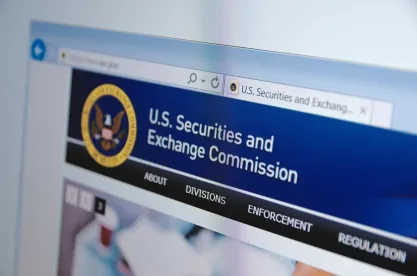On September 16, 2020, the Securities and Exchange Commission (SEC) amended Rule 15c2-11 promulgated under the Securities Exchange Act of 1934, as amended, which sets forth the requirements broker-dealers must comply with to initiate or resume quotations for securities traded in the over-the-counter (OTC) market. The amended rules are designed to enhance the protection of investors in the OTC market by attempting to minimize opportunities for fraud and manipulation, which the SEC believes disproportionally impact the OTC market. Broadly speaking, the amendments:
-
Enhance the reliability and volume of information about OTC issuers that must be reviewed to support quotations.
-
Limit important exceptions to Rule 15c2-11 that previously allowed broker-dealers to maintain markets for OTC securities that lacked current or publicly available information.
-
Add new exceptions that reduce regulatory burdens on market participants quoting OTC securities that the SEC determined to be less susceptible to potential fraud or manipulation.
-
Make other ministerial, conforming, and technical changes.
The full text of the amendments, which will become effective 60 days following publication in the Federal Register, can be found here.
Rule 15c2-11 Amendments
Since 1971, Rule 15c2-11 has required broker-dealers to review certain basic issuer information, and to have a reasonable basis for believing such information is materially accurate and reliable, before initiating or resuming quotations for an issuer’s security in the OTC market. The amendments to Rule 15c2-11 are designed to enhance and modernize these requirements while eliminating exceptions that could potentially lead to market abuses. A summary of the SEC’s key amendments to Rule 15c2-11 follows.
Enhanced Informational Requirements
The recent amendments strengthen the rule’s focus on the adequacy of available information by (i) expanding the group of market participants that must comply with the rule’s information review obligations to include qualified interdealer quotation systems, (ii) requiring information reviewed by market participants to be current and publicly available, and (iii) expanding the list of information to be reviewed to include the identity of company officers and large shareholders, subject to certain exceptions.
Revised Piggyback Exception
The SEC’s amendment narrowed the “piggyback exception” in Rule 15c2-11. The piggyback exception allows broker-dealers to rely on the quotations of another broker-dealer’s review of the OTC securities instead of relying on information directly from the issuer. Under the old piggyback exception, broker-dealers were allowed to publish quotations for OTC securities even when an issuer’s information was not current. The recent amendments will limit this exception by requiring that issuer information be one of the following:
-
Current and publicly available
-
Timely filed as required by certain specified federal securities law reporting obligations
-
Filed within 180 calendar days from a specified time frame
The SEC also added a grace period to the piggyback exception that will permit broker-dealers to continue quoting securities of any issuer for a limited period once the requisite information for that issuer is no longer publicly available, timely filed, or filed within 180 calendar days from a specified period. This limited conditional grace period provides investors with the opportunity to liquidate positions in a broker-dealer-quoted market for up to 15 calendar days from the determination that the issuer’s information no longer meets the above-listed requirements.
Additionally, the amendments will provide greater investor protections by updating the piggyback exception to:
-
Require at least a one-way priced quotation.
-
Prohibit reliance on the piggyback exception during the first 60 calendar days following the termination of an SEC-issued trading suspension.
-
Only permit broker-dealers to rely on the piggyback exception for securities of shell companies for 18 months following the initial priced quotation.
Reduced Regulatory Burdens for Certain OTC Securities
The Rule 15c2-11 amendments also reduce unnecessary burdens on broker-dealers by allowing them, subject to certain conditions, to publish quotations in reliance on qualified interdealer quotation systems that comply with the amended rule’s information review requirements and make a publicly available determination of such compliance.
New exceptions to the information review requirement will allow broker-dealers to:
-
Quote actively traded and highly liquid securities of well-capitalized issuers.
-
Quote securities issued in an underwritten offering if the broker-dealer is named as an underwriter in the offering document, subject to certain conditions.
-
Determine that the requirements of certain exceptions are met by relying on certain publicly available information from third-party sources.
Other Technical, Ministerial, and Conforming Changes
In addition to the changes discussed above, the amendments to Rule 15c2-11 also include other noteworthy changes, such as the following:
-
Adding a provision that aligns the rule with the SEC’s Regulation Crowdfunding and eliminates crowdfunded issuers from the list of “catch-all issuers” subject to the rule’s most stringent information review requirements
-
Adopting a record-keeping requirement that applies to both broker-dealers that publish or submit quotations and a qualified interdealer quotation system that makes known to others the quotation of a broker-dealer pursuant to the rule
The SEC also removed outdated provisions and adopted non-substantive technical amendments to Rule 15c2-11, which was last substantively amended nearly 30 years ago.
John Zimmer contributed to this article.





 />i
/>i

